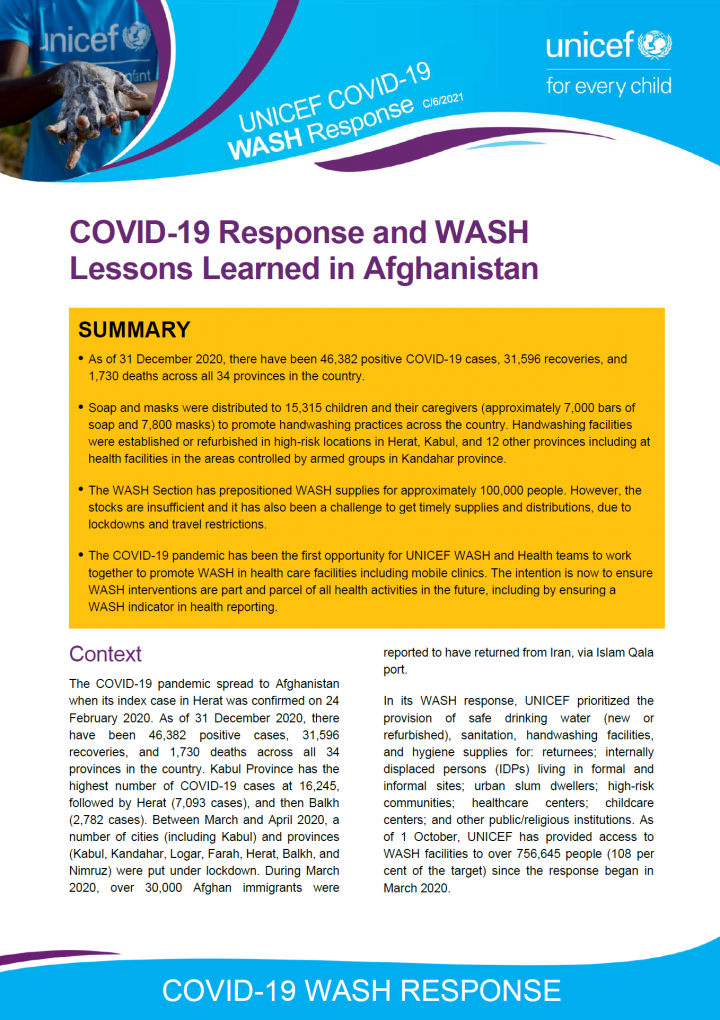COVID-19 Response and WASH Lessons Learned - Afghanistan, Bangladesh, Bhutan, India, Maldives, Nepal, Pakistan, Sri Lanka
Various Authors (2021)

Published in: 2021
Pages: 4
Publisher:
UNICEF
Author:
Various Authors
Uploaded by:
SuSanA Admin
Partner profile:
common upload
1188 Views
65 Downloads
UNICEF’s water, sanitation and hygiene (WASH) country teams work inclusively with governments, civil society partners and donors, to improve WASH services for children and adolescents, and the families and caregivers who support them. UNICEF works in over 100 countries worldwide to improve water and sanitation services, as well as basic hygiene practices. This publication is part of the UNICEF WASH Learning Series, designed to contribute to knowledge of good practice across UNICEF’s WASH programming. In this series:
Discussion Papers explore the significance of new and emerging topics with limited evidence or understanding, and the options for action and further exploration.
Fact Sheets summarize the most important knowledge on a topic in few pages in the form of graphics, tables and bullet points, serving as a briefing for staff on a topical issue.
Field Notes share innovations in UNICEF’s WASH programming, detailing its experiences implementing these innovations in the field.
Guidelines describe a specific methodology for WASH programming, research or evaluation, drawing on substantive evidence, and based on UNICEF’s and partners’ experiences in the field.
Reference Guides present systematic reviews on topics with a developed evidence base or they compile different case studies to indicate the range of experience associated with a specific topic.
Technical Papers present the result of more in-depth research and evaluations, advancing WASH knowledge and theory of change on a key topic.
WASH Diaries explore the personal dimensions of users of WASH services, and remind us why a good standard of water, sanitation and hygiene is important for all to enjoy. Through personal reflections, this series also offers an opportunity for tapping into the rich reservoir of tacit knowledge of UNICEF’s WASH staff in bringing results for children.
WASH Results show with solid evidence how UNICEF is achieving the goals outlined in Country Programme Documents, Regional Organizational Management Plans, and the Global Strategic Plan or WASH Strategy, and contributes to our understanding of the WASH theory of change or theory of action.
COVID-19 WASH Responses compile lessons learned on UNICEF’s COVID-19 response and how to ensure continuity of WASH services and supplies during and after the pandemic.
Readers are encouraged to quote from this publication but UNICEF requests due acknowledgement. You can learn more about UNICEF’s work on WASH here: https://www.unicef.org/wash/
Bibliographic information
Various Authors (2021). COVID-19 Response and WASH Lessons Learned - Afghanistan, Bangladesh, Bhutan, India, Maldives, Nepal, Pakistan, Sri Lanka. UNICEF
Filter tags
East Asia & Pacific English Europe & Central Asia Politicians and local decision makers Practitioners















